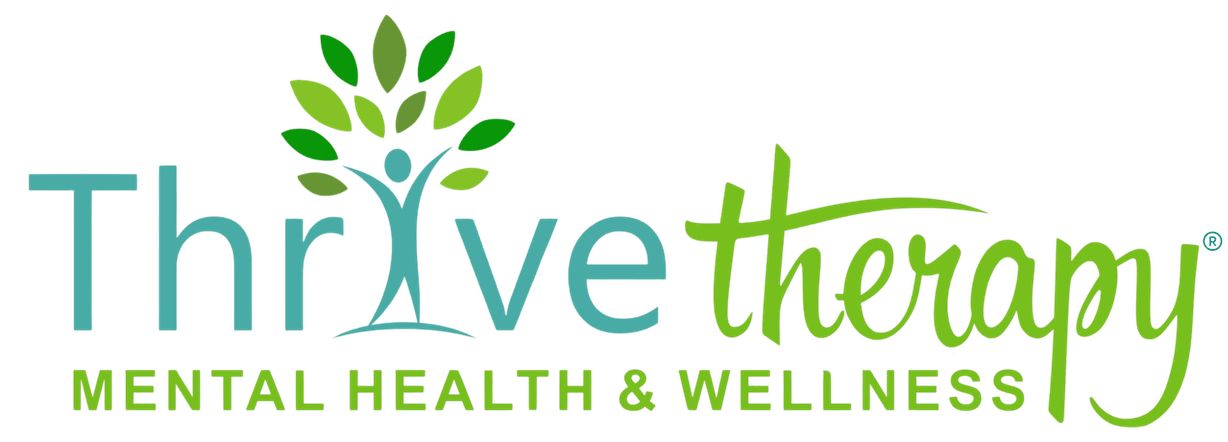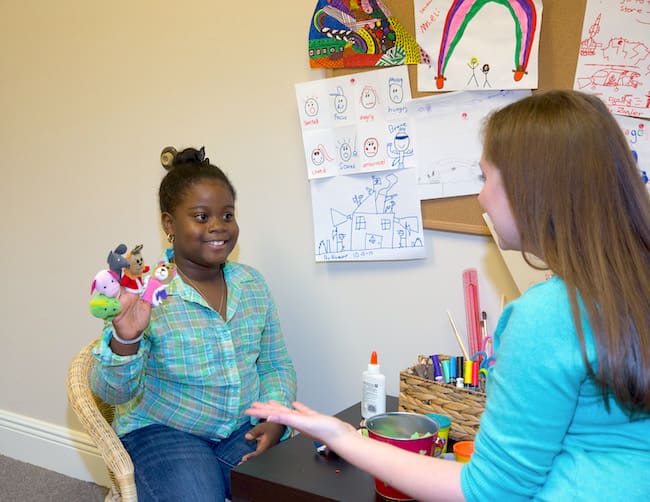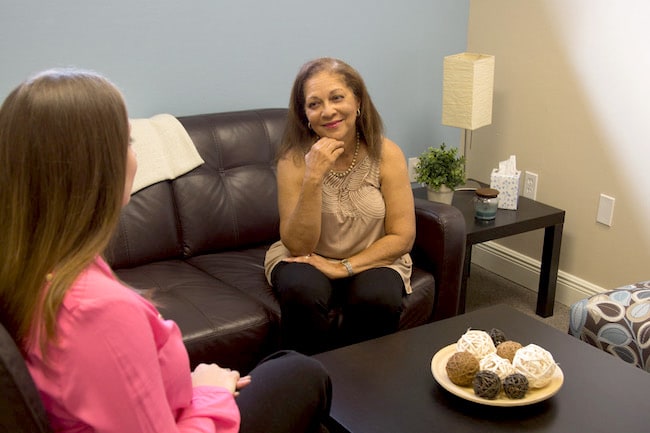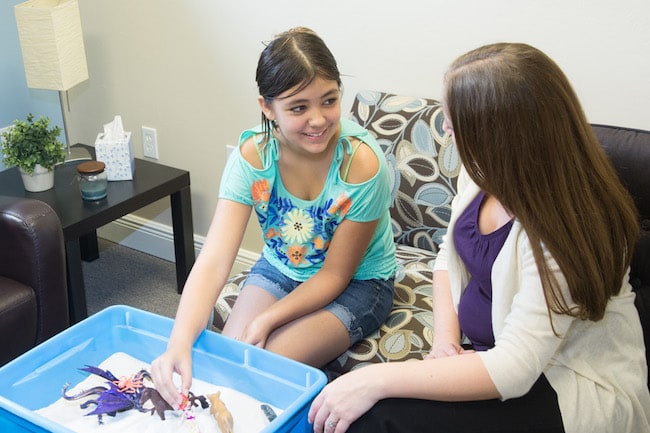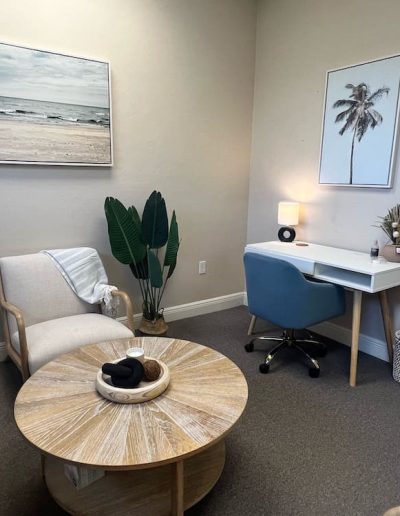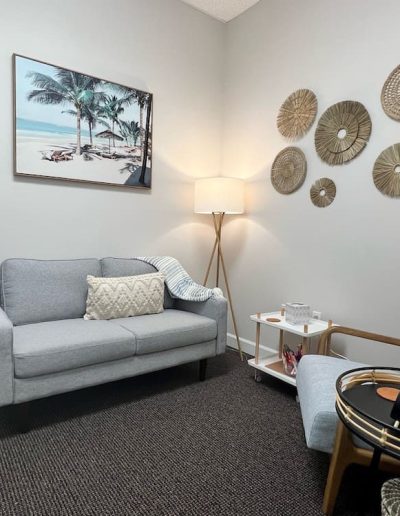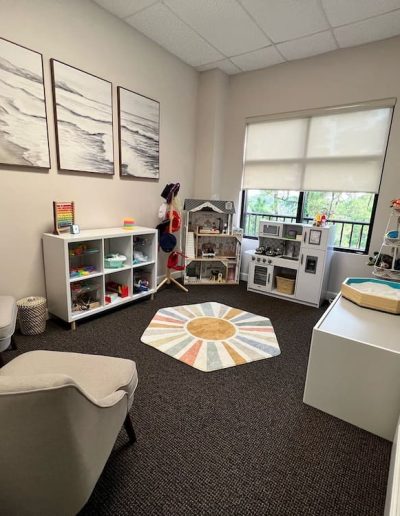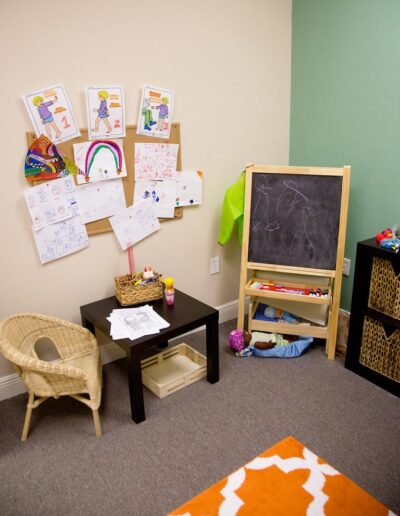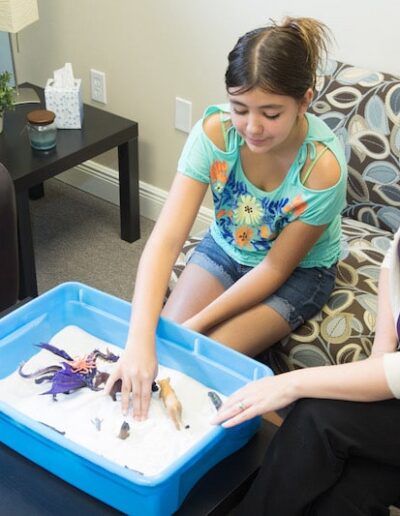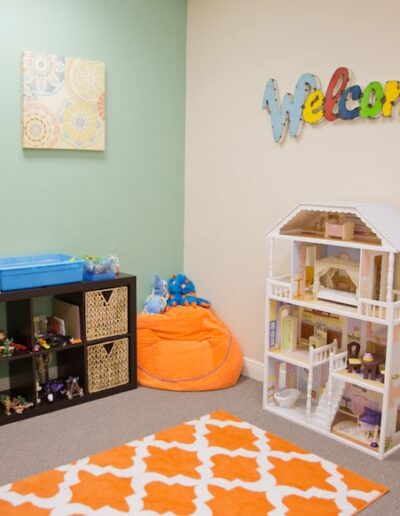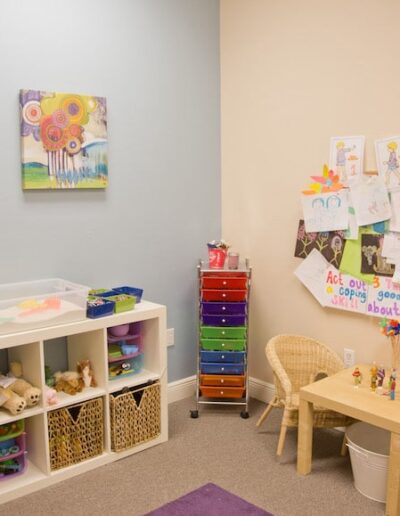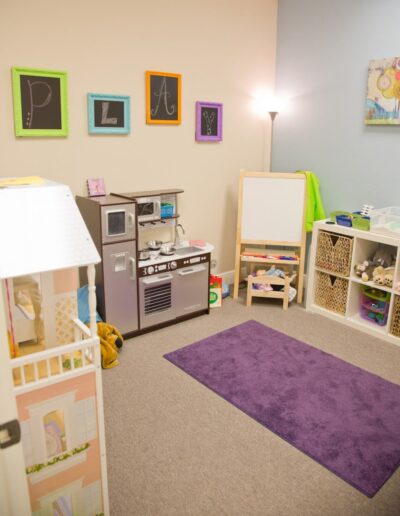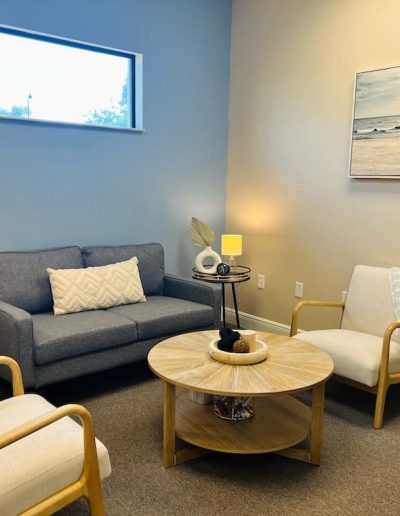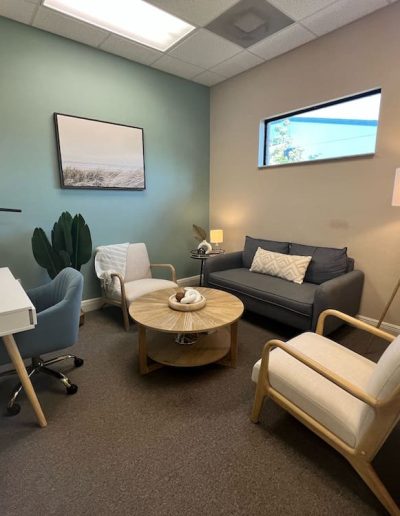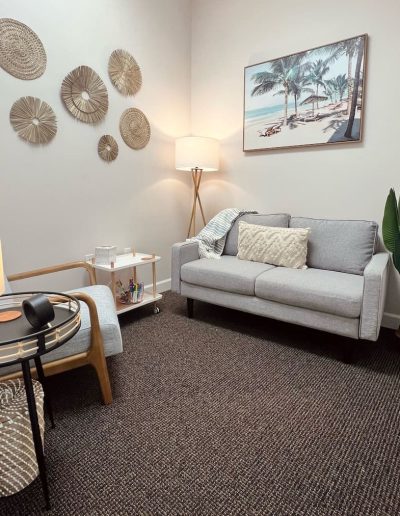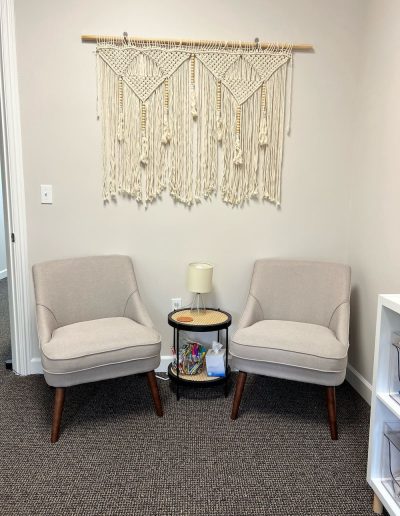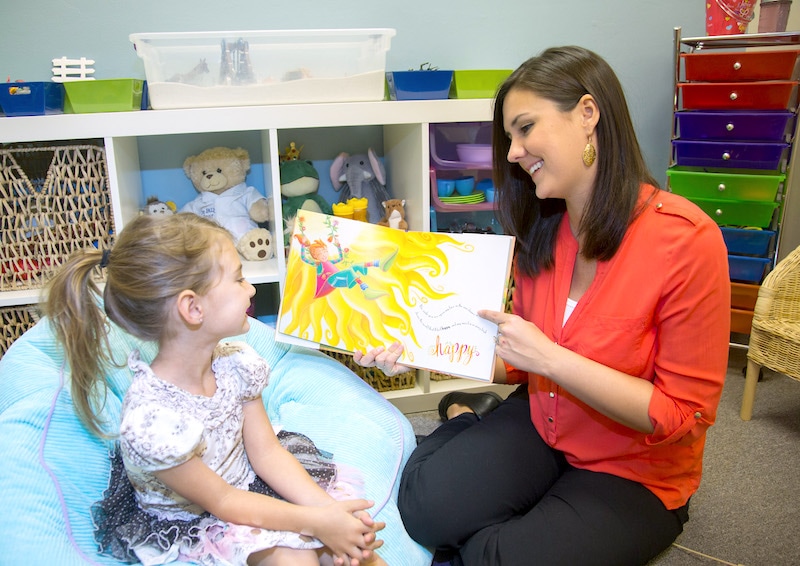Our Specialties
The mind can often heal itself naturally, in the same way as the body does.
Play Therapy
What is Play Therapy?
Play Therapy is a theoretically based form of counseling that is used with children to help resolve psychosocial challenges. Children benefit from play therapy, compared to traditional talk therapy, due to their limited verbal ability to express their thoughts and feelings. In play therapy, children have access to carefully selected therapeutic toys that enable the child to say with the toys what they may not be able to say with words through the use of miniature figurines, art supplies, puppets, and dolls. Play therapy allows the child to work through things they have difficulty with by providing a safe psychological distance from their problems that in turn allows them to express their thoughts and feelings appropriate to their development. It is different from just playing with a child, a play therapist has specialized training to help assess a child’s play and facilitate growth and healing through play therapy interventions. Through play therapy, children learn to communicate with others, express feelings, modify behavior, develop problem-solving skills, and learn a variety of ways to relate to others. Play is the natural language of children. Toys are thought to be a child’s words and play is their language.
Who benefits from Play Therapy ?
Anyone can benefit, however play therapy is generally used with children ages 3 to 12.
How long does Play Therapy take?
Each play therapy session varies in length but usually last about approximately 50 minutes. Sessions are usually held weekly. Research suggests that it takes an average of 20 play therapy sessions to resolve the problems of the typical child referred for treatment. Of course, some children may improve much faster while more serious or ongoing problems may take longer to resolve (Landreth, 2002; Carmichael, 2006).
Looking for more information about Play Therapy?
Contact us today by phone for a free consultation and to schedule your first appointment.
Fort Myers
(239)963-4367
Naples
(239)963-4367
The Woodlands
(281)595-8893
EMDR Therapy
What is EMDR?
The mind can often heal itself naturally, in the same way as the body does. Much of this natural coping mechanism occurs during rapid eye movement (REM) sleep. Francine Shapiro developed the evidenced based psychotherapy intervention Eye Movement Desensitization and Reprocessing (EMDR) in 1987, utilizing this natural process in order to successfully treat Post-traumatic Stress Disorder (PTSD). Since then, EMDR has effectively helped millions of people of all ages with a wide variety of mental health concerns.
What is an EMDR session like?
Throughout the session, the therapist facilitates bilateral, right to left, movement of the eyes or other dual attention stimulation of the brain (tones or tapping), while the client focuses on the disturbing material. The client just notices whatever comes to mind without making any effort to control or direct content. Each person will process information uniquely, based on personal experiences and values. Sets of bilateral movements are continued until the memory loses its painful intensity and becomes less disturbing and is now associated with positive thoughts and beliefs about one’s self. During EMDR treatment, you will remain in control, fully alert and wide-awake. This is not a form of hypnosis and you can stop the process at any time.
EMDR and Memories
When a person is very upset, their brain cannot process information and organize a memory as it ordinarily would. An upsetting experience can become “frozen” in the mind and interferes with the way a person feels, sees the world, and the way they relate to other people. Many people experience persistent negative emotions, intrusive thoughts, and unpleasant body sensations when triggered of the upsetting experience. Most experts agree that the best way to get “unstuck” and become free from the unpleasant symptoms is through exposure to the upsetting experience through processing. EMDR allows the person to work through the difficult memories and allows for the memory to become successfully organized and stored in the brain. EMDR does not take away the memory. You will still remember it, but it will be more distant, vague, and not as distressing. EMDR creates a relaxation response which reduces emotionality and allows for the learning of new information. Natural information processing is then resumed following a successful EMDR session so a person no longer relives the images, sounds and feelings when the event is brought to mind.
Who can benefit from EMDR?
In addition to its use for the treatment of Post-traumatic Stress Disorder, EMDR has been successfully used to treat:
- EAnxiety & Panic Attacks
- EAnger Management
- EInjuries (accidents, sports, dog bites, etc.)
- ERepeated medical interventions
- EOCD
- EReactive Attachment Disorder
- EEating Disorders
- EADHD
- EDepression
- EStress Reduction
- EDomestic Violence
- ECar accidents
- ERobbery
- ESexual and Physical Abuse
- EDissociative Disorders
- ENatural disasters (hurricane, fire, tornado, flood)
- EBody Dysmorphic Disorder
- EPhobias and fears (animals, heights, snakes etc)
- ETriggering Urges (smoking, cutting, etc.)
- EAddictions (substance abuse, gambling, sex)
- ESleep problems
- EComplicated grief or loss
- EPain relief, phantom limb pain
- ESelf-esteem and performance anxiety
Looking for more information about EMDR Therapy?
Contact us today by phone for a free consultation and to schedule your first appointment.
Fort Myers
(239)963-4367
Naples
(239)963-4367
The Woodlands
(281)595-8893
Sand Tray Therapy
Sand tray therapy is a type of expressive therapy that is often used with children, but can be successfully applied with adolescents, adults, families, and groups. Although there are many benefits of utilizing sand tray therapy with clients, its main focus is to enable clients to gain more insight about themselves by providing an understanding of their emotions at a deeper level. Some suggest that sand tray therapy brings forward the unconscious to present awareness.
Through the use of the sand tray and a vast array of miniature figurines, the client creates a symbolic world. The world the client has created then acts as a reflection of their own life and allows greater exploration of hidden or previously unexplored concerns. This form of self-expression is considered non-invasive in comparison to traditional “talk” therapy.
All though sand tray therapy can be used with all types of presenting concerns, it is thought to be most beneficial for clients with histories of child abuse, domestic violence, death of a loved one, anxiety, depression, and separation or divorce.
Looking for more information about Sand Tray Therapy?
Contact us today by phone for a free consultation and to schedule your first appointment.
Fort Myers
(239)963-4367
Naples
(239)963-4367
The Woodlands
(281)595-8893
Why Choose Thrive Therapy?
At Thrive Therapy, we're committed to creating a safe space for individuals of all ages to explore and understand their feelings. Our specialization in EMDR and play therapy, along with a range of other therapeutic techniques, ensures that we can meet the unique needs of children, teens, and adults alike. Our therapists are dedicated to fostering emotional growth and resilience, helping you and your loved ones thrive.
Connect With Us
If you or someone you love could benefit from counseling, we invite you to reach out for a free phone consultation. Our team in Fort Myers, Naples, and The Woodlands is ready to support you on your journey toward healing and growth. Contact your nearest office today and take the first step toward a brighter tomorrow.
What happens at your first appointment?

